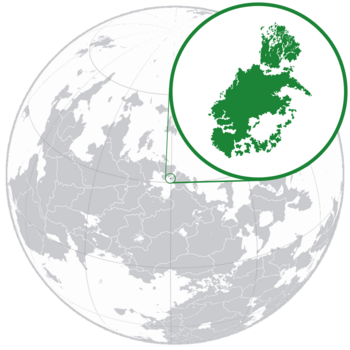Barceria
This article is incomplete because it is pending further input from participants, or it is a work-in-progress by one author. Please comment on this article's talk page to share your input, comments and questions. Note: To contribute to this article, you may need to seek help from the author(s) of this page. |
Royal Citystate of Barceria ᛒᚱᛖᚻᛚᚫᚾᛞᛌᛐᚩᚱᚲᛟᚾᛚᚷᛖᛃᚱ ᛒᚱᛖᚻᛚᚫᚾᛞ | |
|---|---|
|
Flag | |
| Motto: «ᚫᚾ’ᚠᚱᚫᛘᚫᚾᛐᚱᚯ ᚯᚠ ᚯᛘ’ᛈᛖᚱᛋᚩᚾᛖ.» Progress by the people. | |
| Anthem: «ᚹᛁᛋ ᛋᚢᛐᛋᛁᚫ.» Our Lucia. | |
 Locaton of Barceria (dark green) | |
| Capital and largest city | None (city-state) |
| Official languages | Barcerian |
| Demonym(s) | Barcerian |
| Government | Unitary parliamentary constitutional monarchy under a semi-direct democracy |
• Their royal highness | Veronika III. (full name: Veronika Astrid Angelína Hagelín III.) |
• Prime Minister | (Alvin Segrán) |
| Legislature | The Zammensåmma |
| Area | |
• Total | 702 km2 (271 sq mi) |
| Population | |
• 2022 estimate | |
• 2020 census | 5,717,790 |
• Density | 8,145/km2 (21,095.5/sq mi) |
| GDP (PPP) | estimate |
• Total | |
• Per capita | |
| GDP (nominal) | 2020 estimate |
• Total | |
• Per capita | |
| Gini (2020) | low |
| HDI (2020) | very high |
| Currency | Barcerian Krone (ᚲ) |
| Time zone | UTC-4 |
| Date format | dd.mm.yyyy |
| Driving side | left |
| ISO 3166 code | BR |
| Internet TLD | .br |
Barceria, also known as Royal City of Barceria (Barcerian: ᛒᚱᛖᚻᛚᚫᚾᛞ [bɾɛxland] ( listen); ᛒᚱᛖᚻᛚᚫᚾᛞᛌᛐᚩᚱᚲᛟᚾᛚᚷᛖᛃᚱ [brɛxlandʃtɔrkø:nlgɛ:jr] (
listen) is an island nation located in northern Thuadia, in the mouth of the Norterric sea. The country is made up of 30 districts (Barcerian: ᛞᛁᛋᛐᚱᛁᚲᛐ (Distrikt)).
Barceria has a population numbering roughly 5.7 million inhabitants[1], with a density of 8,145 people/km²[1] and a size of 702km². It consists of the main island and a few other smaller, less important islands surerounding the main one, which are mostly home to parks or nature reserves. The country is located in the northern hemisphere, with a cold and humid climate, receiving about 204 rainfall days during the average year.
With a nominal Gross Domestic Product of 430 billion ACU[2], amounting to 75 thousand ACU per capita, Barceria is a nation with a stable and developed economy, with it’s notable industries featuring the pharmaceutical industry, computer engineering, computer science and luxury goods.[2] It has a Human Development Index of 0.929 and ranks among some of the most progressive nations, both in social and economical issues. The country has a large social safety system, with benefits including universal health care, free education on all levels, child support for impoverished families and unemployment benefits.
Etymology
MORE COMING LATER
History
MORE COMING LATER
Geography
MORE COMING LATER
Government and politics
MORE COMING LATER
Economy
MORE COMING LATER
Infrastracture
MORE COMING LATER
Toll roads and expressways
MORE COMING LATER
Public Transport
In 2020, Barceria had a transport modal share: 55% of all trips were done in public transport, 20,5% on foot, 19.9% in car, 4% on bike and 0.6% by aeroplane.
Barceria’s public transport network consists of The U-Bán (ᚢᚾᛞᚯᛒᚫᚾ, ᚢ-ᛒᚫᚾ), trams (ᛋᛈᚯᚱVᚫᚷᚾ, ᛋ-Vᚫᚷᚾ), and trolleybuses. There are currently 10 U-Bán lines (Linrot, Linblau, Lingrun, Linlila, Linbraun, Lincyan, Lingúl, Lingra, Linrosa, and Linorang) with the length of 287km and 259 stations[3], 57 tram lines[3] ,more than 300 bus routes in operation[3] and 3 ferry links[3]. All modes of Public transport are operated and owned by Barceria Unified Transport (BUF, ᛐᚱᚫᚾᛋ ᚢᚾᛁᛐᛖ ᛒᚱᛖᚻᛚᚫᚾᛞ). Barceria has a high rate of public transport usage, with about 2 billion passenger journeys yearly[4].
All modes (metro, tram, buses and ferries) have a common ticketing system that operates on a proof-of-payment system. Basic transfer tickets can be bought for 30, 60 and 90 minute rides, short term tourist passes are available for periods of 24 hours, or 3 and 7 days, and longer-term tickets can be bought on the smart ticketing system TBA, for periods of one month, three months, 6 months or a year.[3][a]
Demographics
MORE COMING LATER
Religion
Main articles: Religion in Barceria, Barcerian Paganism
Barcerians have freedom of religion guaranteed under the Constitution, however the Barcerian Pagan Church, a Paganist organization, is the state church:
The Barcerian Pagan Church is to be the State Church in Barceria and shall be supported and supported and protected by the state.
— Article 25, Section III of the Barcerian Constitution
Approximately 75 percent of Barcerians legally affiliate with a religious denomination, a process that automatically takes place in the first month of a person’s life, and which can later be opted out of. Citizens have to pay a church tax (ᚲᛇᚱᚲᚫᛐᚫᚲᛋ, Kyrkataks), whose profits are directed to support their registered religion, or in the case of no religion, the University of Barceria.
Culture
MORE COMING LATER
See also
References
- ↑ 1.0 1.1 «National Royal Census of Barceria» (WEB). Royal Ministry of Interior. 1 January 2020.
- ↑ 2.0 2.1 «Economical study on the Royal Citystate of Barceria» (PDF). The Commerce. 14 April 2020.
- ↑ 3.0 3.1 3.2 3.3 3.4 tub.br (WEB, Barcerian). Barceria Unified Transport.
- ↑ tub.br/bussines_and_research/data (WEB, Barcerian). Barceria Unified Transport.
Notes
- ↑ All periods are measured in the Gregorian calendar, not the Barcerian Calendar

